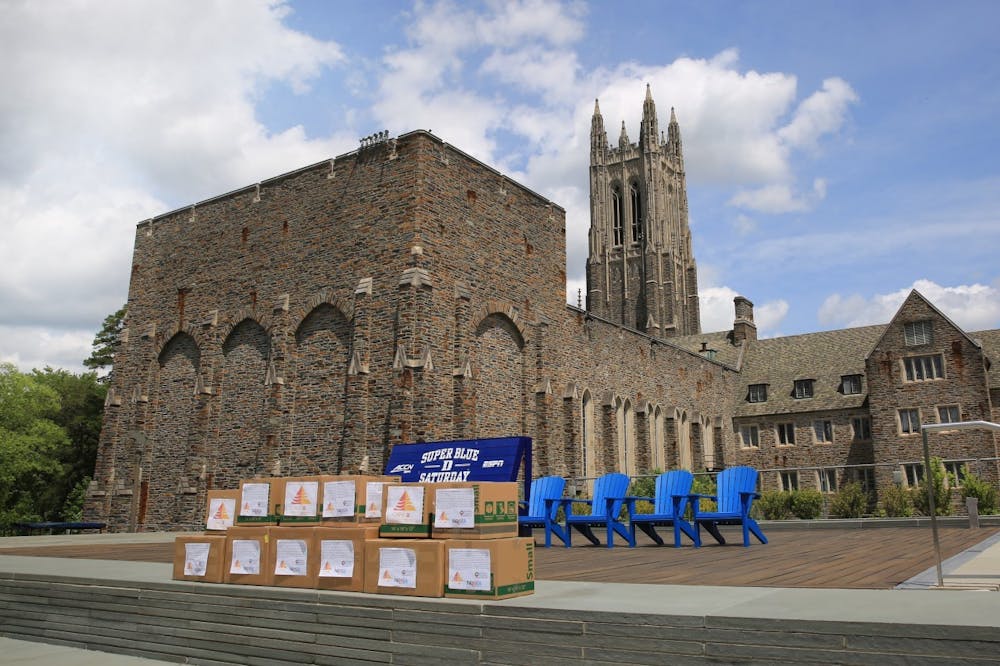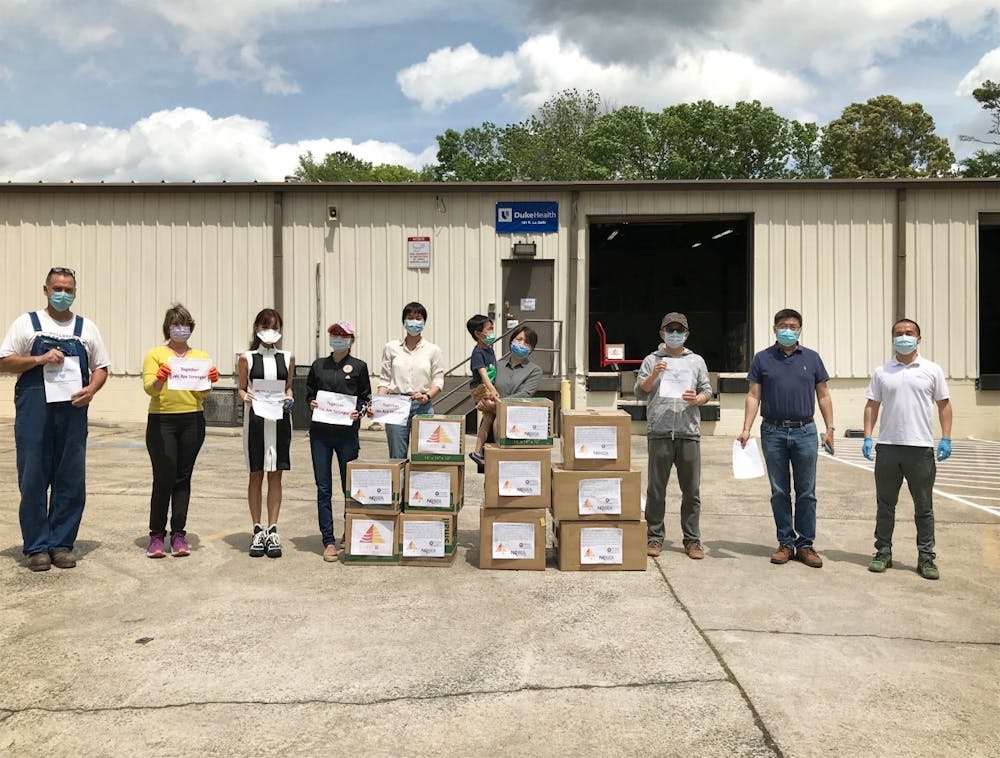Members of the Chinese community at Duke and in North Carolina have stepped up to help fight the COVID-19 pandemic.
Together, a team of Duke professors and staff, as well as local leaders, distributed around $100,000 in protective personal equipment to frontline doctors, essential departments and citizens, as well as providing food for those who were hungry or unemployed.
Zhaohui Wang, executive director of the Woo Center for Big Data and Precision Medicine at the Pratt School of Engineering, said that when the COVID-19 outbreak hit China in January and February, the Chinese community in North Carolina raised close to $200,000 to purchase PPE to send there. They began shipping the equipment in early March.
Later that month, while the situation in China improved, it was the United States that was experiencing a rapid increase in cases and shortages of PPE.
“In March, we decided that it was time for the Chinese community to give back because people helped Wuhan, and now that the situation was happening in the United States, we had to do something to help North Carolina—especially Duke,” said Wang, also co-founder and president of the North Carolina Chinese Scholars Sino-US Exchange Association.
Wang said that the willingness of the local community to help China during their struggle was one of the main reasons they decided to initiate their own fundraising efforts to help Duke, citing efforts by Fuqua students to provide PPE for people in Wuhan as an example.
Wang added that many of Duke’s previous visiting scholars—someone who visits a host university to teach, learn or perform research—who were now serving as doctors in China were “really eager to offer their help.” He said that when his colleagues in China found out about the U.S. outbreak, they frequently checked in on him and asked if there was any way they could help physicians and front-line doctors at Duke.
The team was also inspired by a March statement by President Vincent Price, which offered support to Chinese students and faculty who were experiencing discrimination.
“I have been deeply disturbed by recent reports of bias incidents targeting Chinese, Chinese-American, and Asian individuals throughout the United States,” the statement read. “Meeting the global challenge of COVID-19 calls perhaps as never before on our common humanity and regard for others; it cannot be allowed to become a cause for scapegoating, bias, or hatred.”
Wang said his colleagues were “touched” by Price’s email and that “there shouldn’t be identity to a global pandemic.” He and other leaders started fundraisers to support the frontline doctors and community members who lacked proper PPE.
As of April 21, the team had raised around $100,000 and purchased 35,000 surgical masks, 16,000 N95 masks and 3,000 face shields from China, according to an email from Wang to President Vincent Price.
According to the email, a copy of which was obtained by The Chronicle, they then donated an additional 4,000 surgical masks, 1,200 N95 masks and 400 face shields to Duke Hospital.

Face masks that the team collected to donate.
They also purchased and distributed meals to those who were homeless or had lost their jobs during the pandemic. According to Jianping Yang, president of the Chinese-American Friendship Association of North Carolina, they provided around 1,400 total meals to North Carolinians. He worked with Wake County’s food security agency, who directed the team to local communities that were potentially in need of free meals and food support.
Wang said that the group also wanted to help alleviate the fear many people felt at the time.
“Back at that time, people didn’t know COVID-19 well,” he explained. “People just kind of panic about these things. We didn’t know what this virus was. It was a crazy time, and people were scared.”
The team invited doctors who had fought the virus in Wuhan to speak on a webinar, in which they shared their experiences on the front lines and discussed the best strategies to protect people from infection, as well as what to do once infected.
Jiaoti Huang, professor in and chair of the pathology department at Duke, contributed to the fundraising effort. After learning of a need for PPE at Duke, according to Wang, he posted a message in WeChat, a popular messaging app in China. After only a couple weeks, Huang received almost 100,000 masks from local Chinese American families and colleagues in China.
Huang distributed the supplies among various medical departments at Duke. He also sent some of the materials to hospitals in New York, where hospitals were particularly overcrowded.
Yang told The Chronicle that after first focusing on hospitals and medical clinics with their PPE donations—particularly the University of North Carolina Hospital System throughout Johnston and Chatham Counties—the team began to include donations to individuals once wearing masks in public became a social norm.
They worked with the NAACP to distribute masks at the Martin Street Baptist Church in Raleigh, where each churchgoer received 10 masks.

Boxes of personal protective equipment collected for donation.
In addition to churches, the team donated PPE to fire stations, dental offices and post offices, among others. They donated 1,500 surgical masks, 500 N95 masks and 400 face shields to nursing homes and assisted living facilities, as well as 400 surgical masks to the Duke University Police Department.
Participants also stood in front of stores such as Whole Foods and Home Depot to distribute masks to customers in need.
The team received PPE from local restaurant owners, which they donated to local hospitals alongside food.
Wang said that shipping the supplies from China was one of the bigger challenges in their efforts. While the costs of PPE were generally low, shipping costs were high and the lack of flights from China to the United States at the time led to delays. Yang added that as of May, they were waiting on their last shipment of masks, but had already donated more than 50,000 total to the local community.
Yang noted that a lot of the monetary donations they received came from visiting scholars in China who wanted to continue to support Duke and the surrounding community.
Siqi Zhang, vice president of the NCCSEA, is currently a visiting scholar at Duke. She told The Chronicle that she’s eager to give back to the University after all that it has done for her.
“During my stay at Duke, I have had really good memories,” she said. “I enjoy the research and the learning resources here. I’m really impressed by the diversity and the quality.”
She said that this experience is shared by many visiting scholars, which inspires them to donate and help the University after they return to China.
Correction: An earlier version of this article incorrectly stated that Siqi Zhang is a biostatistics research intern at the Duke Cancer Center. The Chronicle regrets the error.
Get The Chronicle straight to your inbox
Signup for our weekly newsletter. Cancel at any time.

Leah Boyd is a Pratt senior and a social chair of The Chronicle's 118th volume. She was previously editor-in-chief for Volume 117.

